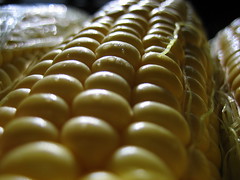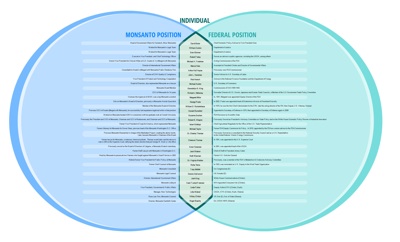 GMOs are feeding the world…
GMOs are feeding the world…
GMOs are destroying our health and environment.
With all of the conflicting information out there about GMOs, it’s hard to understand.
That’s why I am going to break down the basics of GMOs for you and tell you why you should care.
What are GMOs?
GMO stands for Genetically Modified Organism and is most often referred to when it comes to our food.
The DNA from other plants, viruses, animals and bacteria are injected into the cells of existing species. This is supposed to make them more resistant to the rain, drought, pests, etc. Up until this point, these viruses and bacteria have never been a part of the human food supply.
More information on what GMOs are
- 3 sources to buy your non-gmo vegetable seeds: Where to Buy Vegetable Seeds
- The Good Human: What Are GMOs and Why You Should Avoid Them
- NonGMOProject: About GMOs
This sounds great. What’s so bad about them?
At face value this might sound great, but there are risks that are involved in such technology. GMOs have not been proven safe and have significant restrictions or outright banned in over 30 countries across the globe.
They are widely grown and used in the food supply in the United States and there is no way for us to know. GMOs should be labeled, so we can make decisions for ourselves. Whether they are good or bad is a moot point. It’s a right to know issue.
I’ll say it again —
It’s not about if GMOs are good or bad. It’s about our right to know what we are eating. — Tweet This
More information on the effects of GMOs
- RodaleNews: Genetically Engineered Food Gets Doused With Extra Chemicals
- GMO Journal: 6 Reasons to Avoid GMOs
- Organic Consumer Association: Unintended GMO Health Risk
Who produces GMOs?
The company that is responsible for producing most of the GMOs is Monsanto. This is the same company that produced Agent Orange during the Vietnam War. They are a chemical company and now they are producing our food. To me that’s reason enough not to trust their “food.”
Monsanto has been able to patent their GMO seeds, so they own the seed. They also have an exclusive deal with Scotts Miracle-Gro who sells Round-Up.
Now there is a company that owns and sells a seed that is resistant to a spray that they profit off of also. Monsanto makes money off the consumer on both ends.
The fact that a company can own a seed and have that much control over our food supply is a scary thought. Monsanto currently owns about 90% of the seed supply out there. That means they control distribution, costs, etc. Scary.
More information on Monsanto
- OrganicLifestyleMagazine: Monsanto Company Profile
- GreenCartoon: Monsanto Made WMDs I Bet They Make Healthy Food
- Free online documentaries about Monsanto
The World According to Monsanto
httpv://www.youtube.com/watch?v=Rml_k005tsU
The Future of Food
httpv://www.youtube.com/watch?v=EnD-DiDRIJA
If GMOs aren’t considered safe, why would government allow them in our food system?
“The Federal Food, Drug, and Cosmetic Act requires the FDA to prevent consumer deception by clarifying that a food label is misleading if it omits significant, “material” information,” said Naomi Starkman founder of Civil Eats and contributor to the Just Label It campaign.
“In 1992 however, the FDA issued a policy statement that defined “material” by the ability to be sensed by taste, smell, or other senses.
The FDA determined that GE Foods were “substantially equivalent” to conventionally produced foods, so there was no material difference – and no labeling was required. After almost 20 years, this policy is still in effect today.”
If you also look closely at who holds federal positions, you will notice that many of them have held positions with Monsanto as well. Click the image below to get the full picture of the connections between Monsanto and Federal Positions.
What are the most common GMOs?
According to the Just Label It campaign:
- 59% of sugar produced in the US is made from sugar beets and 90% of the beets are genetically engineered
- Over 90% of canola oil is genetically engineered
- 90% of the cotton planted in the US is genetically modified
- 94% of all soybeans planted in the US are genetically modified
- 88% of US Corn is genetically modified
Your turn
Now on to the most important part…what you can do.
- “If you are looking to avoid GE foods, your best options are to buy USDA certified organic, as the USDA organic standards prohibit the use of GMOs,” said Starkman. “Look for Non-GMO Project Verified goods, and to buy unprocessed foods such as fruits, vegetables because few whole foods are genetically engineered.”
- Start your own urban garden using non-gmo seeds.
- Sign the petition at JustLabelIt.org to let the FDA know that you want GMO foods labeled as such.
- Use the buttons below to share this post with friends and family to let them know about GMOs.






















Geez, I guess your readers aren’t concerned much about GMOs judging by the lack of comments. I for one am very pleased that you’re talking about it.
There was lots of comments, sharing and discussion about this one on Facebook and other social media channels. Lots of sharing, which was what I was hoping for — raising awareness.
Thanks for the comment Phil.
“Monsanto currently owns about 90% of the seed supply out there” I’m not getting what you meant by this statement…could explain…?
It means they bought up a lot of the smaller seed companies.
I am hoping that Burpee and Seeds of Change are not owned by Monsato, as those are what I mostly use in my garden. I am trying to get to a point of sustainability as a rule. Down with GMOs!!!
Nice article. Thanks for all the links and tips.
DOWN WITH GMO’s! you damn americans are so inventive yet so want-to-create-an-issue-out-of-nothing. Please inform your readership about the hybridized bulbs, seeds, plants that are currently produced for the by your horticulture industry and have been genetically stored from the previous 3 generations in a dormant strain of their DNA. This type of thinking, alarmists thinking reminds me of the Y2k scare, oooh! GOD HELP US!….more WOMD! doomsday prophets like you should ask which Capitalist company is gaining from climate change or why is “organic foods” so expensive, in lieu of lowering our carbon footprint.
Ummmm, there’s a difference between hybrid plants and the introdution of say….. frog genes into tomatoes so that they’re more resistant to frost. Didn’t you read the article? GMO’s are genetically modifed organizims using genes from “…viruses, animals and bacteria…”.Point being, I want to eat food that mother nature made safe to eat NOT food that was made to resist heavy doses of chemical weed killer and pesticides.
Most of us wouldn’t pick up food that was dropped on the ground to eat because it’s now “dirty”. Why on earth would anyone want food that’s basically been sprayed heavily with toxic chemicals to keeps the weeds and bugs away? I rather eat dirt.
Down with GMO”S !
We’re not doomsday prophets here in America. We want a proven safe food source. DNA splicing or experimentation is illegal here for humans and many animals because of it’s unpredictable and unsuccessful results. Then why are we allowed to ingest mutant DNA, without our knowledge, or consent. I, for one haven’t signed a consent form to be genetic lab rat. If medicine needs to be tested safe for human consumption because it’s created in a lab, then why is every ounce of food we take in not under the same scrutiny? Only tomatoes have ever been tested for safety.
Yes!
If you would like to be part of a lab experiment, that is up to you. I would like the option not be part of it. I believe that I have that right.
Good point.
Burpee is not owned by Monsanto, but they sell a small percentage (less than 5%) of seeds from Seminis which is a subsidiary of Monsanto. To me that’s the same as funding them, which is why I don’t buy from Burpee.
Seeds of Change is owned by the Mars Company, which is another company that I don’t support for several reasons.
Yes Jason. Shame on us for wanting the information to make our own decisions. We are damned, despicable devils for wanting diversity in our food industry, and real food on our tables.
Whatever it takes. I’m avoiding GMOs and Monsanto products at all costs. Monsanto reminds me of the Umbrella Corporation of the “Resident Evil” game series.
I agree it is a good idea to label all food l, but isn’t it a safe assumption that if it doesn’t say certified organic it’s most likely gmo? Why spend the money to label what we already know is inside?
Agent orange yesterday, soylent green tomorrow!
Who or where do you recommend buying seeds? Is there a way to know if seeds we already own are Monsanto seeds?
The second bullet point under “Your Turn” says where to buy non-gmo seeds https://www.urbanorganicgardener.com/2011/03/buying-non-gmo-seeds/
i like people
Agent Orange was produced by the Dow Chemical Company. Monsanto produces Genetically modified plants – but is not the only producer of GM crops. This article is inaccurate and should be corrected or removed. Get your facts straight. People have eaten plant food infected with viruses throughout time and the viruses have no effect on the people. That’s why they are called PLANT VIRUSES.
This is what you need to ask yourself,Who heads Monsanto ,Who is on the Board of Trustees and How are they connected to the Food and Drug,in addition how are they connected to our President of the United States of America and the Global World Corporation Conglomerate Initiative and why the Monopoly on seed ownership, and who are the profit barring share holders in this nice tighty coverup.You will all be very suprised to find out who is tied up in this secret circle of MegaBillions in Profit right down to our own elected officials and Millitary.Now go and reasearch for your self the information I have made pulic but you will have to dig very deep to find the answers that our goverment want left alone.Happy Hunting find out the trueth for your self not the mutterings of commenters on this site or any other site.Become informed and educated and knowone can take that from you.Knowledge is power.
Using for Science Paper
Monsanto was the largest and most deadly producer of Agent
Orange. Their chemical potency was one thousand (1,000) times greater
in deadliness as compared to the other chemical companies producing
Agent Orange during the Vietnam War era.
Today, half of Agent Orange’s chemical compound, 2, 4,-D, and other
pesticides like roundup, are the chemicals being sprayed on GMO
(genetically modified organism) crops, resulting in triple the danger of
food that is not organic. Imagine what happens to a body already
exposed to Agent Orange, like the countless Vietnam Veterans and their
children that we at COVVHA advocate for, when consuming these GMO
pesticides and foods. In a nutshell, Agent Orange was, in essence, the
chicken before the GMO egg.
March against Monsanto (MAM) was
created by Tami Canal, a stay at home mom from a small town in Utah.
She was prompted to take action after her family’s ever rising grocery
bill to ensure she wasn’t poisoning her family. Instead of staying
angry, she channeled her energy into creating a protest to spread
awareness of the atrocities being committed by Monsanto and to encourage
boycotts. Her main objective is to ensure the health, longevity and
fertility of her daughters, things Monsanto and their GMO poison
threaten.
(COVVHA) Children Of Vietnam Veterans Health Alliance INC.
has teamed up with March Against Monsanto and built an Agent Orange
Awareness program that will prove to be a long lasting and far reaching
campaign within both organizations.
On October 12, 2013 COVVHA joined MAM for the second global March
Against Monsanto. Several cities that participated in the day’s events
hosted guest speakers from COVVHA’s own private membership base to rise
up and publicly share their personal experiences about Agent Orange.
Their videos are now being provided for the public to watch and will be
released over the next few weeks.
Knowledge IS power. If you want to make informed decisions on the subject of GMOs. Try reading actual scientific information from reputable sources. GMOs have been more thoroughly tested than ANY food product. No other produce you buy has been, even your so-called organic. Anything that has ever evolved in nature, plant or animal, involved a change in DNA. When a person crossbreed plants or animals the same thing is happening. The difference is a genetic scientist is able to choose one precise characteristic. If you don’t want to eat something that has been genetically altered, you will have to stop eating Because of the extensive testing of GMOs it costs literally millions for each type of seed. The above article is very biased and inaccurate. It doesn’t mention GMOs being more resistant to pests (less pesticides), more drought resistant (less water used), more prolific (yes, feed more people). GMOs are considered safe. Even the World Health Organization has stated this. GMOs have been around for more than twenty years. If you insist on perpetuating conspiracy theories, think about why some groups, including seed companies, are using scare tactics against GMOs. They are afraid of possibly losing business in the future. The odd thing about that is there are literally zero GMO seeds available to the public at this time. Monsanto and other GMO producers have zero percentage of that market. Also no chemicals are used in GMOs. No DNA from animals were used in plants ( someone has been watching too much science fiction). I don’t work for the government, Monsanto, or any one related to the production of GMOs. I just like to make my decisions based on fact.
A minor correction. Monsanto is not a chemical company. It divested all of it’s chemical businesses 15 years ago except RoundUp which it still manufacturers. RoundUp is the most widely used herbicide but only generates about 10% of Monsanto’s world wide sales. In perspective RoundUp sales place Monsanto as the 6th or 7th largest producer of chemicals world wide.
As they generate 90% of their sales from seeds and other agricultural products they are an agribusiness company not a chemical company.
A couple last points. I am not a Monsanto employee and I grow and eat organic. I’ve always found that fact or truth over propaganda however cleverly disguised always works best.
Terry it’s not that they’ve been watching science fiction it’s that too many “like minded” people get their information from social media. What’s worse, they believe it!
Don’t live in fear. Ask a scientist. Please. The following is kind of long, but I tried to make it easy to understand.
It is disheartening that so many people like the author here are so afraid, angry and utterly misinformed about the science of GMOs. To anyone who is worried about the safety of genetic modification of foods please read on, or, better yet, contact a biologist at your local university. Any plant biologist could teach you enough about genetics and plant genetic transformation techniques in 1-2 hours for you to be assuaged of your fears for the rest of your life. I promise, it is not that complicated, so don’t be intimidated. We scientists are very annoyed at this sort of fear mongering and will be very willing to do our part to combat the ignorance, as I see many other commenters here are doing.
Here is a specific homework assignment that will put you on the right track and will illustrate some of more inaccurate assumptions in this article: Learn the difference between coding and non-coding DNA. The prevailing genetic modification technique does indeed, as the author mentions, result in the insertion of a small amount of known DNA sequence from the agrobacterium (a common soil bacteria) genome into the plant. That DNA does not code for any protein. It is not used by the plant. It is like the margins on a page of text, so fearing it is not very justified. Moreover, agrobacteria have been doing this to plants for millions of years. In nature, agrobacteria are plant pathogens that insert genes into the plant that causes the plant to produce a nutrient that the bacteria want. It is a fascinating strategy. Biologists simply borrowed the bacterium’s natural ability to insert foreign DNA and we then replace those genes for making the nutrient with whatever we want. This is to say, whatever we believe will make the plant more hardy or increase yield, generally, so we can do our part to help feed the world’s alarmingly fast-growing population. The viral DNA the author refers to is also non-coding DNA. Viruses are particularly good at getting their own genes to be highly expressed by their host. When we add a new gene to a plant, we often borrow the regulatory sequences from a plant virus to ensure that our gene is expressed strongly and in all the different cell types of the plant. This regulatory DNA is called a gene promoter. Again, it doesn’t do anything except dictate how much the gene we insert is expressed, so there’s nothing to fear from this either. While the parts of bacteria and virus DNA used in GMOs is inert, I will also point out that whole agrobacteria and plant viruses are everywhere in the soil and on plants. You’ve been eating them all along anyway. The conversation should not be about these non-coding DNAs, but instead should be about the actual gene that is being inserted. Often this is just a gene from another plant, but it could be from any other source depending on what the scientists are trying to accomplish. The point is, what we insert is a rational choice, and the burden of proof for safety should be based on what we know about the gene we have inserted. If a soybean gene is moved to corn, is there much cause for alarm? We’ve been eating both for ages. Other situations may warrant further study.
As for safety testing, my understanding is that this is done with animal systems and over a somewhat brief period of time (around 6mo). Certainly more would always be desirable, but at the end of the day you can’t really decisively “prove” a negative result, as the author would seem to want, neither could you show the absence of health complications throughout the entire life-span of all the diverse peoples throughout the world. That is not a realistic expectation.
Lastly, I want to comment on the agribusiness landscape. There is a lot of animosity towards Monsanto, a major–although certainly not the only–producer of GM crops. I do not defend Monsanto, as, if the documentaries are to be believed, some of their business practices seem quite aggressive towards independent farmers. They are a business. They seek profits and they owe that to their shareholders. What did you expect? I do not, however, fear eating any of their foods because my knowledge of the science convinces me that there is no logical reason why I should be fearful. If you want to condemn Monsanto for their business tactics, that is fine, but as a point of perspective, know that they are not the only potential villain in this scene. Who benefits most when people fear GMOs? It is this newly-formed “organic” food industry and its accompanying book authors and promoters. While I am sure many are well-meaning, as an industry, they perpetuate and prey upon the misguided fears of a scientifically illiterate public. I do not mean to insult the public, as plant genetics in no way falls within the realm of common knowledge. Just remember that bias works in both directions here. Will you be governed by fear or by reason? Get informed. Ask a local scientist.
Thank you for posting that is very informative.